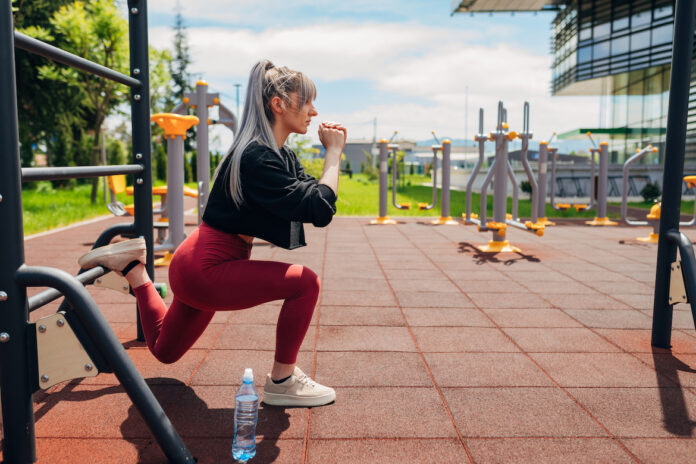[ad_1]
The quickest approach to enhance your lower-body energy and steadiness is by including single-leg workout routines into your routine.
If you’ve got been solely counting on double-leg workout routines, corresponding to conventional squats or calf raises, it’s possible you’ll be favoring your dominant aspect with out realizing it. Incorporating single-leg workout routines will help you determine and handle any muscle imbalances.
“It is regular for one leg to be stronger than the opposite as no person is completely symmetrical,” says Grayson Wickham, DPT, CSCS, bodily therapist and founding father of Movement Vault. “This isn’t an excuse to have a big energy distinction in a single leg versus the opposite. It’s best to attempt to have comparatively equal energy in each legs and equal joint mobility in each of your hips, knees, and ankles.”
Forward, we dive into the advantages of single-leg workout routines and the most effective strikes so as to add to your exercise routine.
In This Article
-
01
-
02
The advantages of single-leg workout routines
Single-leg (unilateral) workout routines are these workout routines that require you to face on one leg. Conventional double-leg workout routines ought to have a spot in your train routine, however there are some distinctive advantages of single-leg workout routines.
“Everybody can profit from including single leg workout routines to their exercises,” Dr. Wickham says. “With that stated, when you discover you are favoring one leg greater than the opposite throughout a double-leg train, corresponding to squats or deadlifts, you will wish to incorporate single-leg workout routines into your exercises.”
Listed below are seven main advantages of single-leg workout routines.
1. They stop muscle imbalances
“When solely performing double-leg workout routines, it’s normal to create energy imbalances in a single leg versus the opposite. Usually your dominant leg will get stronger over time as you are likely to weight shift in the direction of that leg through the train,” Dr. Wickham says. “Single-leg workout routines are efficient for enhancing energy variations and imbalances in a single leg versus the opposite.”
Performing single-leg workout routines forces your dominant leg to work simply as exhausting as your non-dominant leg. You might not even notice how a lot your dominant aspect takes over till you attempt these workout routines.
2. They beat back accidents
Single-leg workout routines stave off accidents by stopping muscle imbalances that may result in overtraining or repetitive accidents on the dominant aspect. Having equal muscle energy on either side additionally ensures your physique strikes in a coordinated approach, which may additionally stop accidents.
That is of specific significance to athletes: A Might 2011 examine in Physical Therapy in Sport noticed that soccer gamers with a 15 % distinction in leg muscle energy had been 2.5 instances extra prone to have a leg harm. These findings might be translated to different leg-dominant sports activities, too.
3. They enhance steadiness
“Single-leg workout routines are nice for enhancing your steadiness as you’ll be utilizing one leg for help versus two legs,” says Wickham.
Standing on one leg forces your stabilizing muscle groups, together with your core and glutes, to activate. The extra you’re employed on single-leg workout routines, the stronger these stabilizing muscle groups grow to be. This helps enhance your steadiness and stability, which will help stop accidents and falls, in keeping with an April 2022 evaluate in Perceptual and Motor Skills.
4. They strengthen your core
Single-leg workout routines strengthen your core higher than double-leg workout routines, in keeping with a small Might 2012 examine within the European Journal of Applied Physiology.
When standing on one leg, your core muscle groups should work exhausting to maintain you secure and safe. Though these workout routines principally strengthen your legs, they’re additionally working your abdominals on the identical time.
5. They’re nice for post-injury rehab
Single-leg workout routines are perfect for strengthening and regaining mobility in your leg after an harm. They’re necessary to make sure muscle imbalances don’t develop. In addition they assist stop and reverse muscle atrophy which will have occurred, particularly in case your decrease extremity was immobilized in a solid for a while.
You might be stunned to study that standing on one leg additionally helps to strengthen the other leg, in a phenomenon known as cross-education of the muscles. For instance, doing a single-leg calf increase in your proper aspect helps strengthen your left calf. Researchers say it has to do with the neural pathways being related to either side of the physique.
These kinds of workout routines additionally assist enhance vary of movement in your leg.
“Single-leg workout routines may also be used to enhance joint flexibility and mobility since you’ll l have the ability to carry out workout routines by way of a better vary of movement,” Dr. Wickham says.
6. They assist enhance sports activities efficiency
In the event you’re searching for a approach to enhance your efficiency with sports activities, it is best to give unilateral workout routines a attempt. Many sports activities require you to have the ability to shortly shift your weight from one leg to the opposite with pace, steadiness, and agility. Some sports activities additionally require you to push off or leap on one leg.
Single-leg strengthening helped to enhance the switch of energy from one leg to the opposite, how shortly you may change instructions, and unilateral leap energy, in keeping with a September 2022 examine in Biology of Sports. These abilities are helpful for all sports activities.
7. They place much less stress in your again
If in case you have again ache, single-leg workout routines will help you strengthen your legs with out placing as a lot stress in your again.
Single-leg workout routines help you successfully strengthen your legs by holding lighter weights than you would want to with double-leg workout routines, which places much less stress in your backbone, a small August 2018 examine within the International Journal of Sports Physical Therapy discovered.
“Everybody can profit from including single leg workout routines to their exercises.” —Grayson Wickham, DPT, CSCS
The most effective single-leg workout routines so as to add to your exercises
Attempt these seven single-leg workout routines to enhance energy, steadiness, and mobility.
“These workout routines might be carried out with added weight or body weight solely,” Dr. Wickham says. “The important thing with these workout routines when specializing in enhancing steadiness is to carry out them slowly and thru your full vary of movement.”
If in case you have had any latest leg accidents, speak to your physician earlier than beginning a brand new train routine. Cease in case you have any ache with any train. In the event you’re uncertain of your steadiness, ensure you have a secure floor shut to carry onto as wanted.
1. Bulgarian cut up squat
This single-leg train strengthens all of it—your glutes, quads, hamstrings, and calves. Your core additionally works exhausting to maintain you balanced and secure.
Begin by performing this train with out weight till you nail the shape, after which add weight, progressively growing the load as you get stronger. “Heavy single-leg Bulgarian split squats are my favourite single-leg train for energy,” Dr. Wickham says.
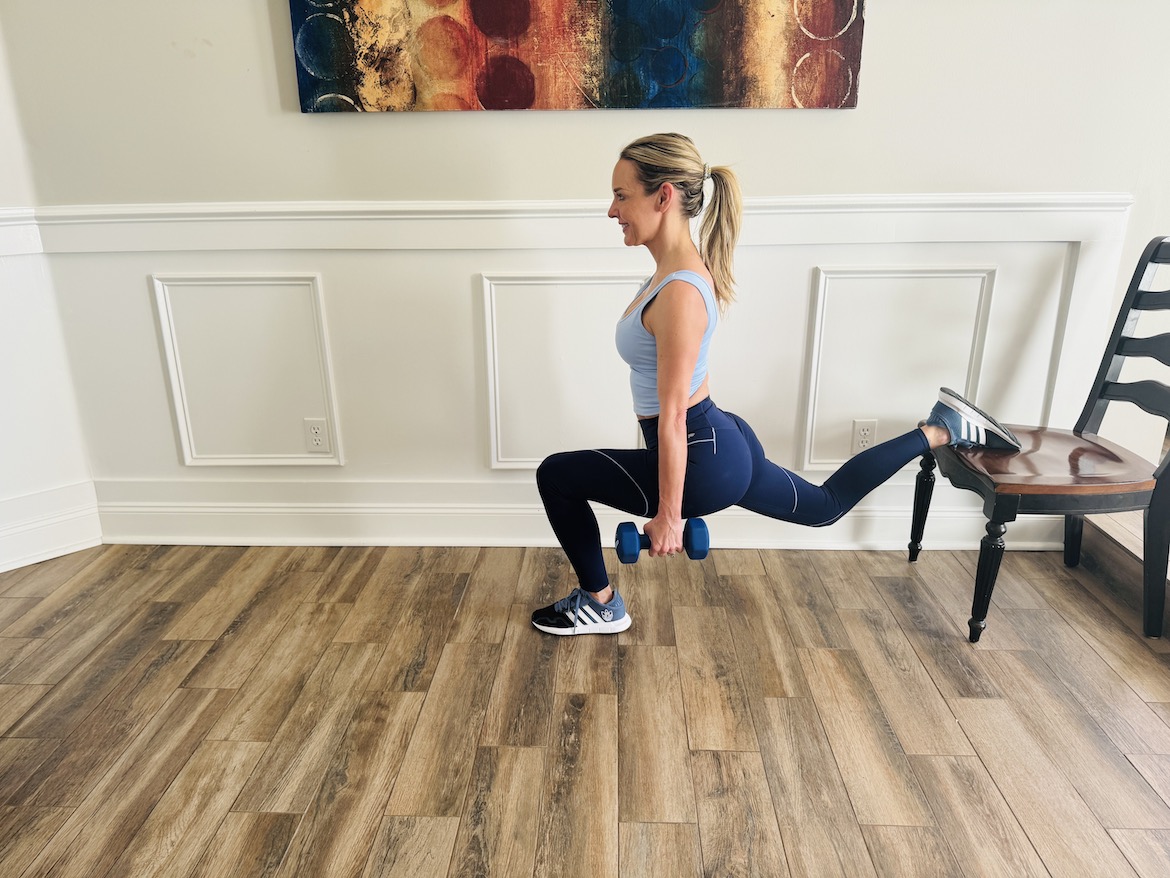
- Stand a number of ft in entrance of a bench, field or chair, going through away from it.
- Attain your proper foot again and place the highest of your proper foot flat on the floor. You might must hop your left foot ahead so you are able to do a correct lunge.
- Lean your torso ahead barely and bend your entrance knee to sink your hips towards the ground as little as you may comfortably go.
- Your front-leg shin ought to be vertical or near it, whereas your again knee ought to level down towards the ground. If both leg is misplaced, transfer your entrance foot ahead or backward till you’ve discovered the perfect positioning.
- Push by way of the center of your entrance foot to return to standing.
- Repeat for 3 units of 12 to fifteen reps on every leg. Full all reps on one leg earlier than switching to the opposite.
2. Single-leg Romanian deadlift
The one-leg Romanian deadlift targets your hamstring muscle groups, but additionally works your glutes, quads, calves, core, and again. This transfer can be a superb approach to enhance your steadiness and stability. You can begin with out weight till you get the shape down.
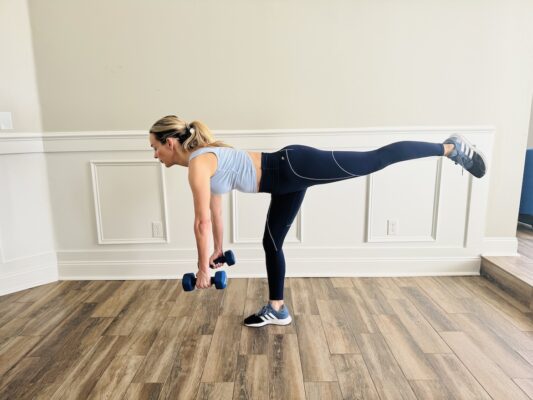
- Stand shoulder-width aside. You might maintain a dumbbell in every hand for added weight. In any other case, place each fingers in your hips.
- Shift your weight to your proper leg.
- Interact your core and hinge your hips ahead, extending your left leg behind you. Press your proper foot into the bottom whereas doing so, and maintain your proper leg barely bent.
- Your again ought to be straight and try to be in a straight line out of your head to your left foot. Preserve your head wanting ahead.
- Slowly return to the beginning place.
- Repeat for two to three units of 10 to 12 reps. Full all reps on one leg earlier than switching to the opposite.
3. Hip airplane
That is certainly one of Dr. Wickham’s favourite strikes to work on each hip and glute energy and steadiness. As a result of there may be additionally a rotational element to it, it additionally improves hip mobility.
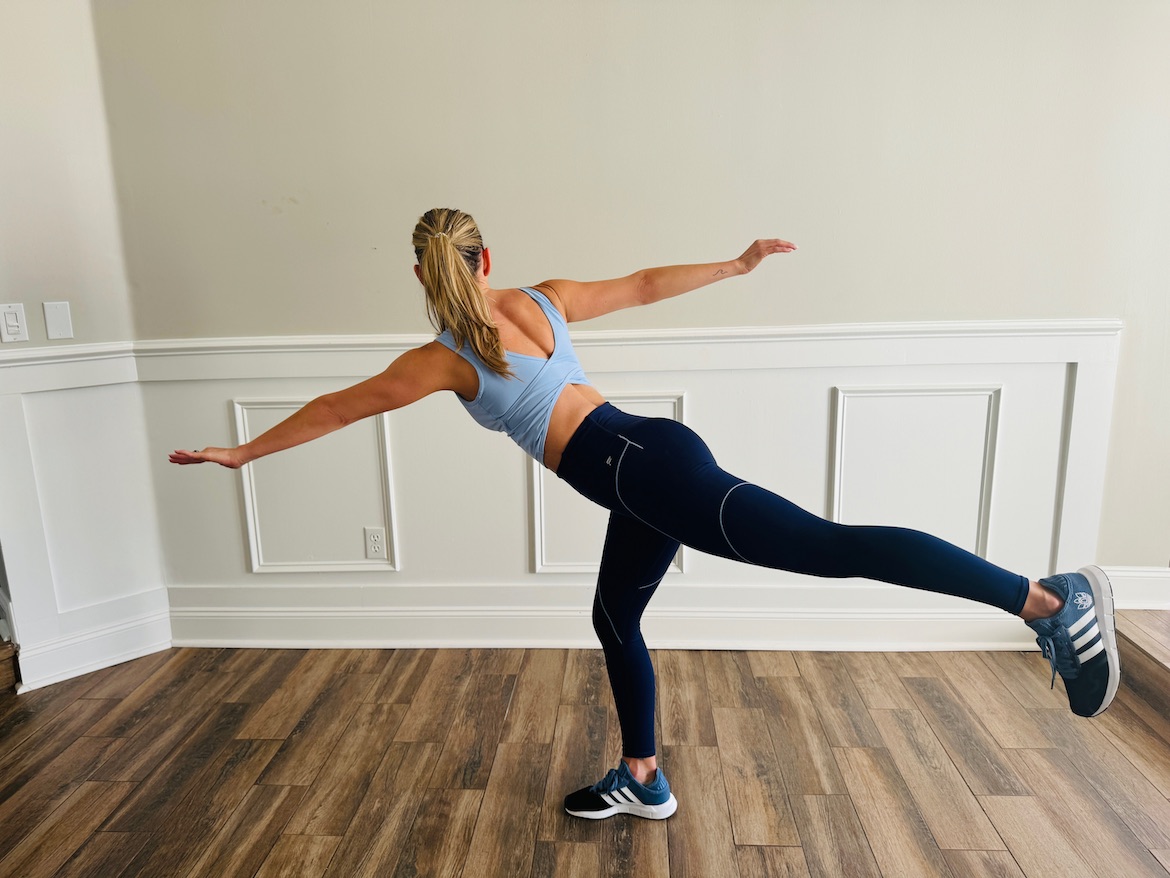
- Begin by standing together with your ft shoulder-width aside.
- Shift your weight to your proper leg and hinge ahead at your waist together with your arms straight out to the aspect.
- Preserve your proper leg barely bent—don’t lock it out. Your left leg will likely be straight behind you.
- Proceed hinging till your physique is in a straight line. Your shoulders and hips ought to be pointed on the flooring.
- Maintain for five seconds.
- Subsequent, rotate your shoulders and trunk as one unit in towards your standing leg.
- Maintain for a number of seconds after which return your torso so it is again going through down towards the ground.
- Rotate your torso within the different path, holding a number of seconds earlier than returning to the beginning place with shoulders going through the ground.
- You’ll be able to put your left leg right down to relaxation between units, or you may proceed rotating to every aspect.
- Attempt to rotate 3 to five instances on either side earlier than standing up.
- Repeat for 1 to three units.
4. Single-leg glute bridge
You are most likely acquainted with the glute bridge exercise. The one-leg model actually works your leg muscle groups, particularly the gluteus maximus muscle (the biggest butt muscle). It additionally strengthens your hamstrings, quads, and calves. As well as, your core muscle groups will likely be working exhausting to maintain you secure all through the movement.
The single-leg glute bridge is demonstrated under utilizing a resistance band, however you are able to do it with out the band and add it in when you’re prepared for extra resistance.
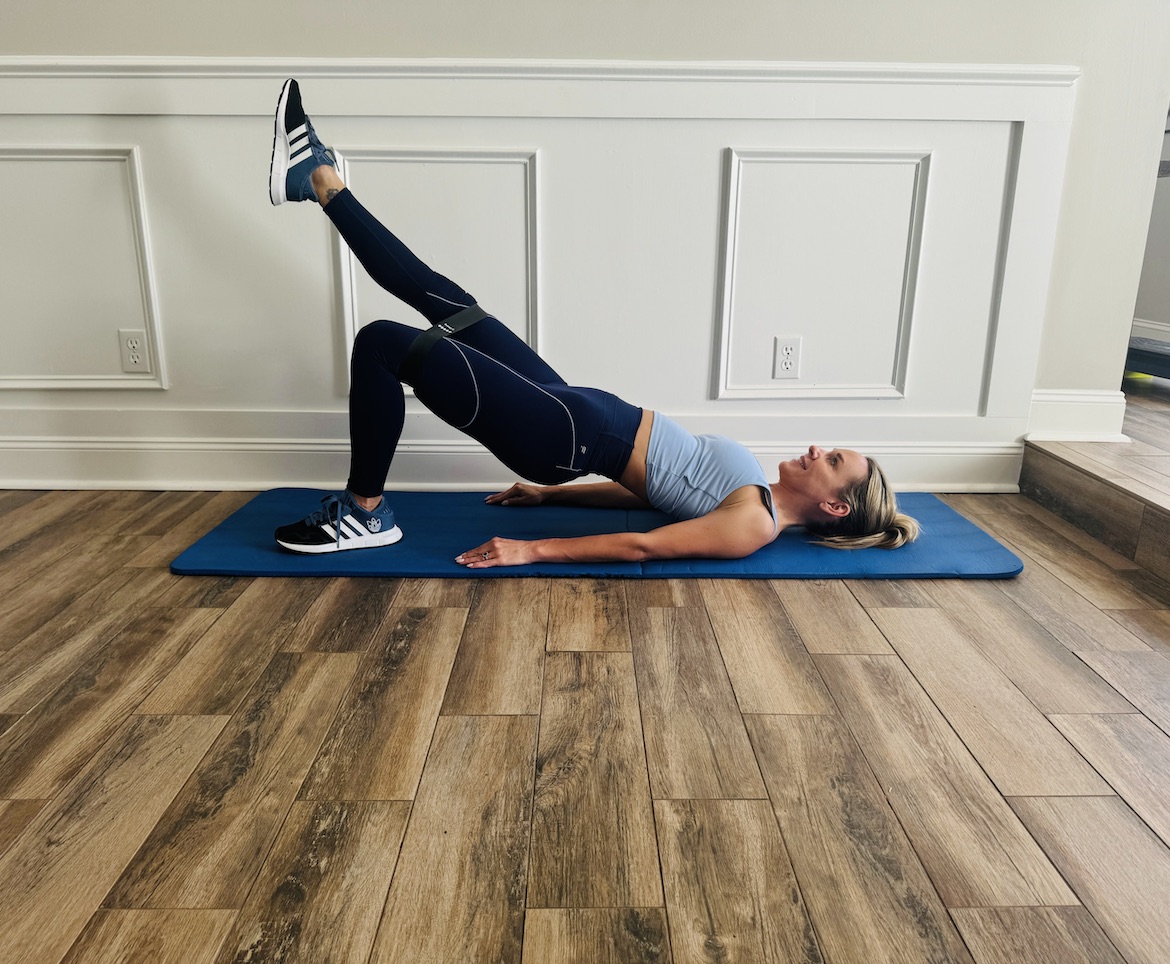
- Lie in your again together with your knees bent and your ft flat on the ground, hip-width aside. Place your arms by your sides, palms on the ground.
- If utilizing a resistance band, place it proper above your knees.
- Elevate your proper foot off the bottom and straighten it. Don’t increase it larger than your left knee.
- Urgent by way of your left heel, squeeze your core and glutes to raise your hips up off the bottom.
- Maintain for a number of seconds and decrease again down.
- Holding your proper leg within the air, proceed reducing and elevating your hips 12 to fifteen instances.
- Repeat with the opposite leg.
- Do 2 to three units.
5. Single-leg squat
The one-leg squat is a extra superior transfer and may solely be completed when you’ve acquired primary squat kind down. It strengthens your glutes, hamstrings, quads, calves, and core muscle groups. If in case you have any knee ache when doing this train, it is best to keep on with the usual double-leg squat.
There are additionally a number of variations of this transfer: To make it simpler, use a chair to squat into for extra stability. To make it tougher, you are able to do leap squats on one leg.
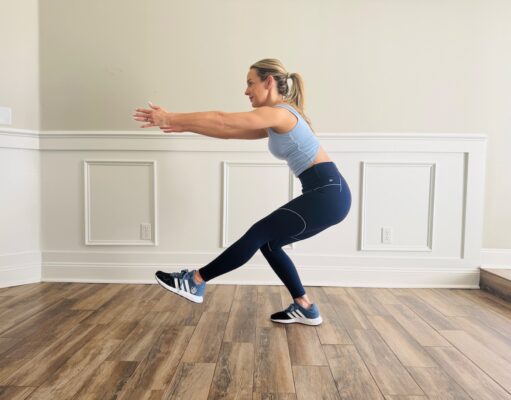
- Stand in your proper foot.
- Maintain your left leg straight out in entrance of you at about knee peak.
- Push your hips again and and bend your proper leg. Squat so far as you may comfortably go and nonetheless preserve management. Your objective ought to be till your hips are parallel to the bottom.
- Return to a standing place.
- Repeat 10 to 12 instances.
- Repeat on the opposite leg.
- Carry out 2 to three units.
6. Single-leg step-up
This single-leg train will work your core, however your glutes, calves, quads, and hamstrings may even really feel the burn. This train strengthens your muscle groups concentrically (to raise you up on the step) and eccentrically (to decrease you down on the step). You’ll be able to maintain dumbbells in every hand for added weight.
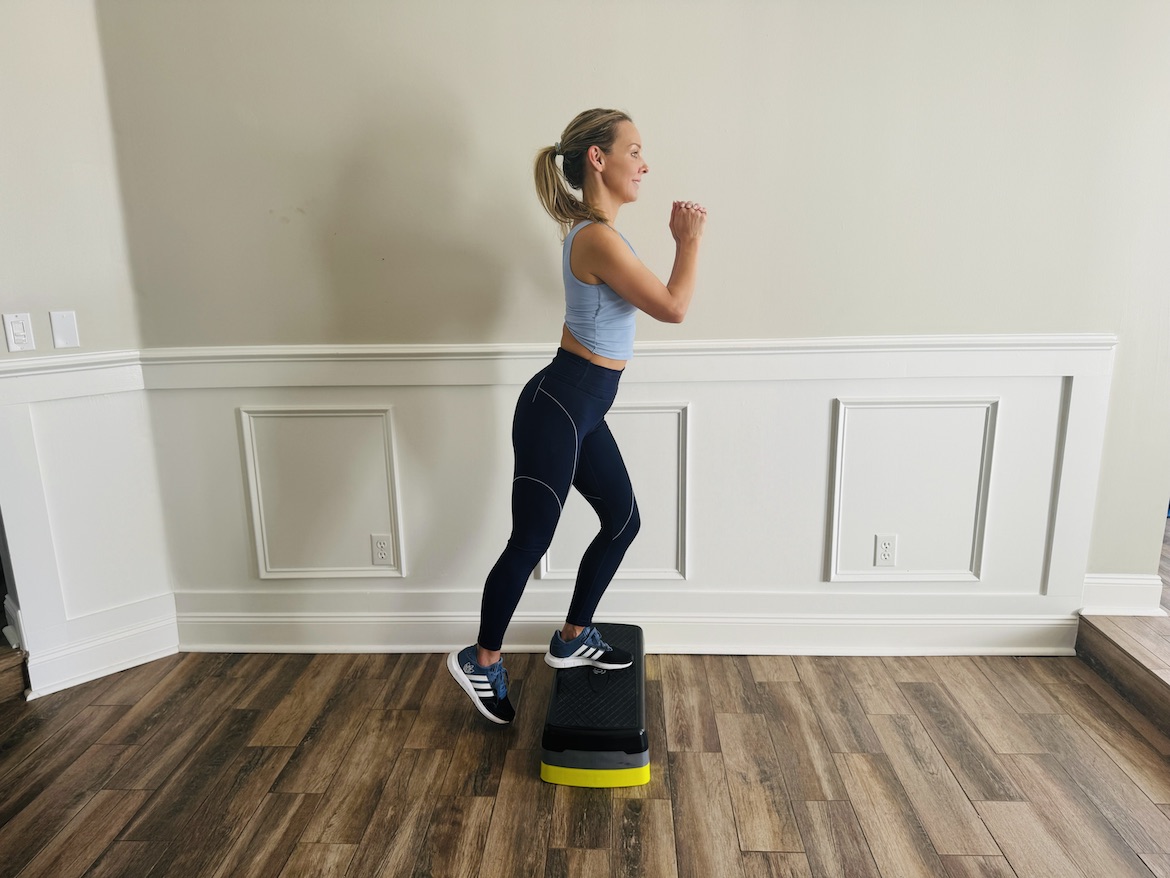
- Stand in entrance of a stair, step, or field.
- Place your left foot up on the step. The step ought to ideally be excessive sufficient in order that your knee is at a 90-degree angle.
- Press into the heel of your left foot as you raise your self up till your left leg is straight.
- Your proper foot can come up on the step however attempt to maintain your weight shifted to your left aspect.
- Slowly decrease your self down.
- Repeat 10 to fifteen instances.
- Repeat on the opposite leg.
- Carry out 2 to three units.
7. Single-leg calf increase
For these trying to construct up their calf muscle groups, this single-leg model could be very efficient. Along with strengthening, this train will increase the pliability of your calf. Maintain dumbbells for added weight and to construct up muscle mass extra shortly.
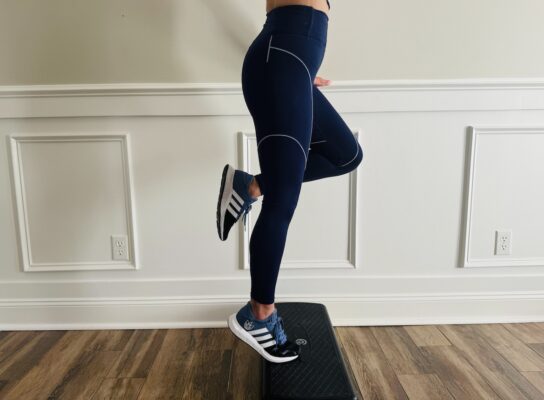
- Stand on a stair, step, or field. Maintain onto a wall or different secure floor for help if wanted.
- Stand in your proper leg and let your proper heel dangle off the step, maintaining the entrance half of your foot on the step.
- Push by way of your proper foot as you increase the heel of your proper foot as excessive as it should go.
- Pause for a second and decrease your proper heel again down. You’ll really feel a stretch alongside the again of your proper calf.
- Repeat 12 to fifteen instances.
- Repeat on the opposite leg.
- Carry out 2 to three units.
[ad_2]
Source link


